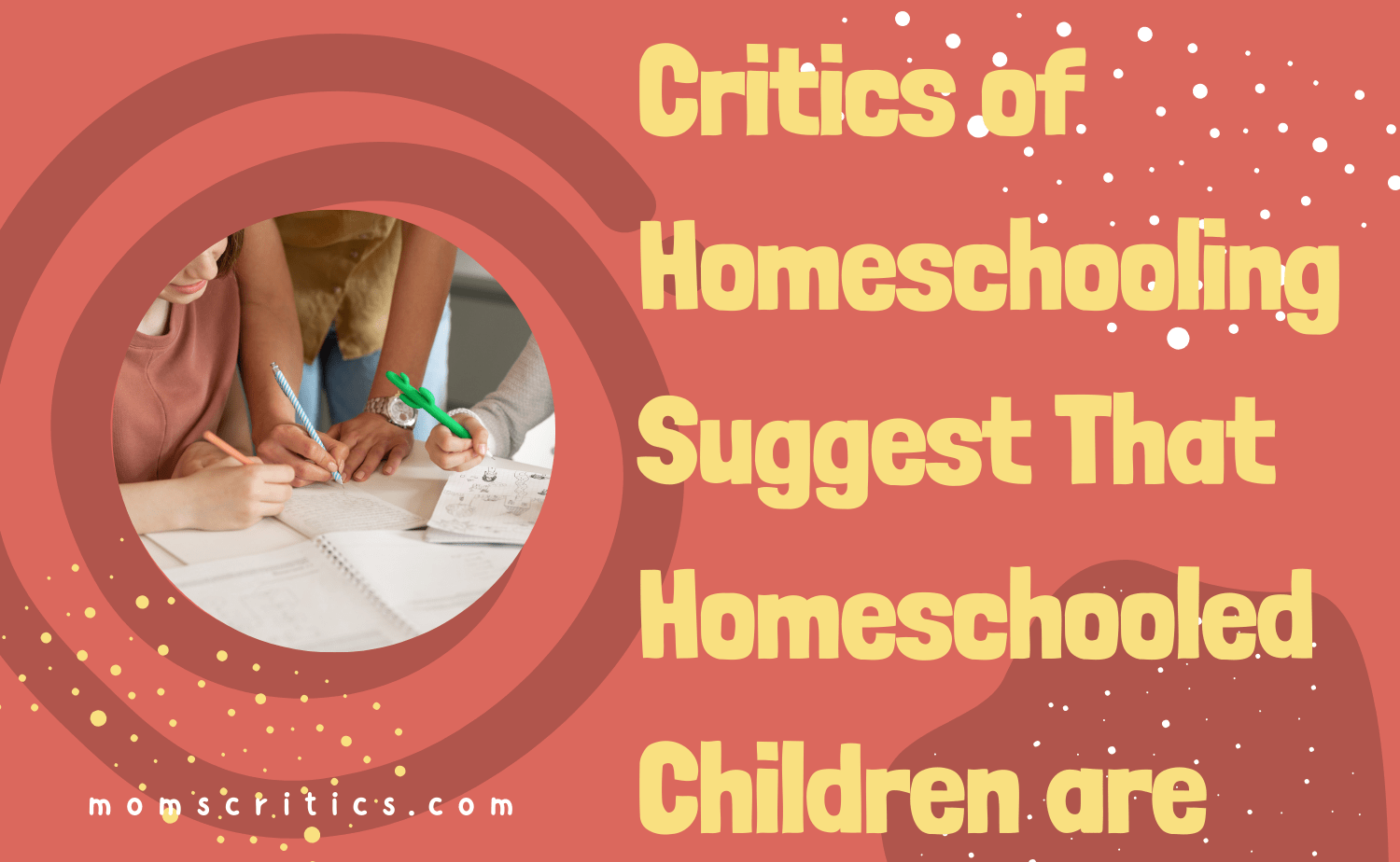I love homeschooling my kids because I can spend more time with them and get to know them. I also believe they are getting a better education than in public school.
That being said, I think there are some legitimate criticisms of homeschooling. You’ll hear from people who critics of homeschooling suggest that homeschooled children are sheltered, behind their peers academically, socially awkward, and so on.
But, most of the criticisms are not fact-based and just regurgitating what they’ve heard without any first-hand knowledge.
Here’s the thing, if you’re doing it right, homeschooling your children shouldn’t make them any of those things. I would argue that homeschooling can help prevent many of those issues.
But! As a parent who has chosen to homeschool, it’s essential to be aware of these potential criticisms and prepare thoughtful responses.

Critics of homeschooling suggest that homeschooled children are Sheltered:
One of the most common criticisms is that homeschooled children are sheltered. People who hold this belief think that because homeschooled children are not exposed to the same things as their peers who attend public school, they miss meaningful socialization opportunities.
They also think that because homeschooled children are not around other kids their age all day, they are not learning how to deal with people who are different from them.
However, this could not be further from the truth!
Homeschooled children have more opportunities to socialize than their peers in public school. They are involved in extracurricular activities and community service, and they have friends from all walks of life, not just those who attend school.
This isn’t me just trying to defend homeschooling. There have been studies that back up this claim. A Vineland’s Adaptive Behavior Scale survey found that homeschooled children had the same social skills as their peers in public school. Even their maturity, communication, and social skills were at a subscale of 84% compared to the average public school child at 23%.
Some might say that homeschooled children are sheltered because they are not around other kids their age all day.
However, this criticism is based on the false assumption that the only place to learn social skills is in school.
Homeschooled children are not sheltered. In fact, they have more opportunities to socialize than their peers in public school.
Critics of homeschooling suggest that homeschooled children are behind their peers’ academics
You’ll find that some critics of homeschooling suggest that homeschooled children are academically behind their peers.
They think that because homeschooled children are not in a traditional school setting, they are not receiving the same level of education.
They also believe homeschooled children miss essential opportunities to learn from qualified teachers.

Well, no way!
Studies have shown that homeschooled children are just as innovative as their peers in public school. In fact, a study by the National Home Education Research Institute found that the average homeschooled child outperforms their public school peers academically.
The study also found that homeschooled children are likelier to attend college and earn a degree than their peers in public school.
Critics of homeschooling suggest that homeschooled children are socially awkward.
Do you think your kids will be socially awkward because they are homeschooled?
That’s a valid concern. But the good news is that no evidence suggests homeschooled children are any more socially awkward than their peers in public school.
I’ve written a separate guide on social awkwardness in homeschoolers and how much it’s exaggerated. After going through tons of resources and asking from the experienced (even from my personal experience), this claim appears false.
Homeschooled children are not socially awkward. In fact, they have more opportunities to socialize than their peers in public school – If you do it the right way.
As a homeschooler, you can ensure that your child attends social events, extracurricular activities, and community service opportunities. I’ve found my kids’ involvement in co-ops, local libraries, and field trips a tremendous socializing experience.
They also think that because homeschooled children are not around other kids their age all day, they don’t see homeschoolers doing teamwork, group learning in libraries, collaborating with local groups in their neighborhood, playing sports and games each evening, and so on.
Critics of homeschooling suggest that homeschooled children are at a disadvantage in college
It’s true to some extent that chances of getting into the college depend on the college policies and sometimes on the state policies, but that doesn’t mean homeschooled kids can’t get into the college of their choice.
If you are done homeschooling with college in mind, there are plenty of ways to prepare your child for college. And chances of getting admission to a successful homeschooler are pretty high than those of average students.

Especially after the 2020 revolution, institutes and colleges prefer more and more students who have unique skills or are self-taught. And there is no doubt that homeschoolers are plentiful in both of these.
Furthermore, there’re multiple graduation options for homeschoolers. From Diploma and GED to CLEP and AP, there are numerous ways for a homeschooler to get into college.
I’ve talked to many college admission officers, who said they would not hesitate to admit a homeschooled student. Some colleges even have special programs for homeschoolers.
Critics of homeschooling suggest that homeschooled children are not well-rounded
They think that because homeschooled children are not in a traditional school setting, they are not exposed to various subjects.
But it’s not the case, at least in my experience.
- My homeschooled daughter loves writing, and I make sure she writes daily.
- She is also passionate about art, and we have enrolled her in an art class.
- I also make sure she is getting the proper knowledge of science. I hired a specialized retired professor last month for her with the responsibility to teach her subjects like biology, chemistry, and physics while I focus on my business.
- She is also taking a drama class and a dance class.
- By spending time with me, she is learning about her responsibilities; as she is mature now, I also assign her some tasks and house chore-related stuff.
- I solely focus on introducing new opportunities and adventures to my children that can help them in the future.
- We often prefer life experiences and socializing when we don’t feel like going through the textbook much.
Homeschooling allows us to try everything!
All in all, I think homeschooled children are well-rounded. They are exposed to a variety of subjects, experiences, and opportunities. And I believe they are better prepared for the real world.
Critics of homeschooling suggest that homeschooled children are not exposed to diversity
It’s a valid concern, but it’s not accurate. Homeschoolers are exposed to diversity the same way as public school students – through the community, books, and the internet.
Incorporating diversity into the curriculum isn’t a single formula. It depends on your area, available resources, and the child’s interests.
But I think exposing children to different cultures, races, and religions is essential. It helps them understand and accept others. And it also helps them appreciate their own culture and background.
Homeschooled children are just as exposed to diversity as public school students. Especially when it comes to incorporating diversity, Multicultural books per suggest subject, the internet, and community experiences are the best ways to do that.
Why did I choose to homeschool my kids?
Whether public schools even exist, homeschooling is a “viable option” for learning. Today’s homeschoolers come from all walks of life and have many reasons for choosing this lifestyle. Still, no matter their defense, they can’t be denied that they are having success in the most challenging academic environment out there- the real world!

The schools have become a place where children are taught to believe things that most likely aren’t true. They’re brainwashed into thinking parents’ values and beliefs are outdated, incorrect, or evil because their curriculum is filled with hate messages towards anyone who disagrees with the progressive agenda being pushed on them by teachers.
Homeschooling has allowed me to instill my family’s values in my children without worrying about them being corrupted by the public school system.
She is now a responsible young woman with interest in many hobbies. She learned how to cook, sew and manage her household when she was 15 years old! At this age, we’re already seeing some of our best qualities, such as creativity or leadership skills.
I am so lucky to be able to spend time with my daughter and share her adventures. We both enjoy our connection in school, but it isn’t just through her schooling activities where we have a fantastic rapport – she’s also involved in many extracurriculars such as frontier girls troops or bright keepers groups! Tennis lessons at our local court nearby singer/songwriter concert series etc… These different pursuits help us grow together while staying connected all along.
I wouldn’t have it any other way. Critics of homeschooling can say what they want, but I know I made the best decision for my daughter when I homeschooled her.
Is homeschooling right for you?
There is no one-size-fits-all answer to this question, as the best educational route for a child depends on many factors such as learning style, family circumstances, and more. However, homeschooling can be an excellent option for those looking for more individualized education, family time, or a different social environment for their children.
Homeschooling can be an excellent way to provide a more individualized education for a child. This is because homeschooling parents can tailor the curriculum and pace of learning to their child’s needs and interests. Additionally, homeschooled children often have more opportunities for one-on-one attention from their parents than public school children.
After hearing people about critics of homeschooling suggest that homeschooled children are this and that, you don’t have to be so sure about what they’re trying to tell you. Just know that each child is different, and each family has different needs. What works for one may not work for another. The best educational decision is the one that is best for your child and your family.
Not just for me, but most parents who have transitioned to the homeschool path have found that their children are doing better academically, socially, and emotionally.
It is a process we must go through to unlearn the lies of the public education system and relearn how to think for ourselves and our children!
But let me warn you!
Homeschooling is hard, and it’s hard because it’s worth it.
You will be challenged every single day to step out of your comfort zone, grow in patience and grace, and fight for what is best for your children even when it’s not the popular opinion.
Homeschooling will stretch you, but it will also bless you beyond measure. If you are called to this path, know that you are not alone! There is a community of homeschooling families out there who will encourage and support you on this journey.
Let me know what you think!
More Related Guides

Keira Addison is a mother pursuing homeschooling for her kids for decades. She loves sharing her experience and practical advice about homeschooling, which has made her a popular authority on the subject. As a professional author, Keira knows how to communicate clearly and effectively with her audience, making her an ideal source of information for anyone considering homeschooling their children.

